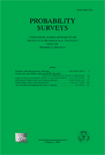
Probability Surveys
Scope & Guideline
Unlocking Insights in Probability for Researchers and Practitioners.
Introduction
Aims and Scopes
- Stochastic Processes and Their Applications:
The journal focuses on various stochastic processes, including Markov processes, random walks, and stochastic differential equations, highlighting their applications in fields such as finance, physics, and biology. - Statistical Mechanics and Random Matrix Theory:
It explores the connections between probability theory and statistical mechanics, particularly through the lens of random matrix theory, providing insights into fluctuation formulas and asymptotic behaviors. - Percolation Theory and Limit Theorems:
The journal emphasizes research on percolation theory, including last passage percolation, with a focus on limit theorems and their implications for graph and network models. - Numerical Methods and Simulation Techniques:
Probability Surveys includes studies on numerical methods for stochastic processes, offering reviews and surveys that contribute to the practical implementation of theoretical results. - Advanced Topics in Probability:
The journal features advanced topics such as Malliavin calculus, Stein's method, and the geometry of information structures, catering to researchers interested in cutting-edge developments in the field.
Trending and Emerging
- Advanced Stochastic Dynamics:
The emergence of papers on stochastic dynamics, particularly those exploring the Polchinski equation and its applications, highlights a growing interest in dynamic systems and their probabilistic underpinnings. - Interdisciplinary Applications:
There is an increasing trend towards applying probabilistic methods in diverse fields such as cosmology and continuum physics, showcasing the interdisciplinary nature of current research. - Limit Theorems and Asymptotic Analysis:
Recent works emphasizing limit theorems, especially in complex models like Schramm-Loewner evolutions, reflect a heightened focus on asymptotic behaviors and their implications in probability. - Innovative Sampling Techniques:
The introduction of novel sampling methods, such as partial rejection sampling, points to an emerging interest in enhancing computational efficiency and effectiveness in probabilistic modeling. - Random Fields and Gaussian Processes:
There is a notable increase in research concerning smooth Gaussian fields and their applications, indicating a rising interest in random fields and their properties.
Declining or Waning
- Traditional Combinatorial Methods:
The frequency of papers focusing on traditional combinatorial methods in probability has decreased, indicating a possible shift towards more analytical or computational approaches. - Basic Probability Theory without Applications:
There is a noticeable decline in papers that delve into fundamental probability theory concepts without practical applications, suggesting a preference for research that bridges theory with real-world scenarios. - Elementary Probability Models:
Papers discussing basic or elementary probability models are less common, reflecting a trend toward more complex and nuanced models that better capture real-life phenomena.
Similar Journals

Journal of the Indian Society for Probability and Statistics
Fostering Collaboration in Probability and StatisticsJournal of the Indian Society for Probability and Statistics, published by SpringerNature in Germany, is a prominent platform dedicated to advancing the field of statistics and probability. With its E-ISSN of 2364-9569, the journal features rigorous research articles, reviews, and theoretical advancements aimed at promoting the application of statistical methodologies in diverse areas. As part of the academic community since 2016, it has maintained a commendable Q3 ranking in the Statistics and Probability category for 2023, indicating its growing influence and relevance. As the journal aims to foster collaborations among statisticians and probabilists, it serves as an invaluable resource for researchers, professionals, and students looking to deepen their understanding and share innovative ideas. While the journal operates under a subscription model, its commitment to open access publication contributes to the broader dissemination of knowledge in this vital field, further enhancing its importance and utility within the scientific landscape.
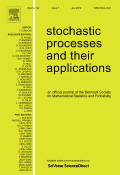
STOCHASTIC PROCESSES AND THEIR APPLICATIONS
Innovating Solutions through Statistical AnalysisSTOCHASTIC PROCESSES AND THEIR APPLICATIONS, published by Elsevier, is a leading journal in the realms of Applied Mathematics, Modeling and Simulation, and Statistics and Probability. Established in 1973 and continually evolving with the latest research trends, this journal has secured its place in the Q1 category across multiple disciplines, reflecting its influence and prestige in the academic community. With a Scopus Rank of #90 in Statistics and Probability and notable rankings in Applied Mathematics and Modeling and Simulation, it serves as a crucial platform for disseminating cutting-edge research findings and applications of stochastic processes. Although it operates under a traditional access model, its comprehensive scope encourages submissions from a diverse range of topics that push the boundaries of knowledge in probability theory and its practical applications. Researchers, professionals, and students are invited to contribute original research, reviews, and case studies that can propel the field into new territories, further solidifying the journal's role as an essential resource for advancing understanding in stochastic processes.

BERNOULLI
Advancing the Frontiers of Statistical KnowledgeBERNOULLI is a prestigious peer-reviewed journal dedicated to the field of Statistics and Probability, published by the renowned International Statistical Institute. Since its inception in 1995, this journal has established itself as a vital resource for researchers and professionals, achieving a remarkable impact factor and consistently ranking in the top quartile (Q1) of its category as of 2023. With a strong presence in the Scopus database, where it ranks #64 among 278 journals in Mathematics, it places in the 76th percentile, underscoring its significance in the academic landscape. Although not an open-access journal, its contributions are pivotal for advancing statistical theory and its applications across various disciplines. As Berounlli continues to evolve until 2024, it remains committed to disseminating high-quality research that fosters innovation and supports the global analytics community. The journal’s scope encompasses a wide range of topics in statistics, including but not limited to theoretical statistics, applied statistics, and data analysis, making it an essential read for anyone engaged in statistical research.
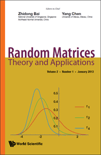
Random Matrices-Theory and Applications
Unlocking the Mysteries of Random MatricesRandom Matrices-Theory and Applications is a premier academic journal published by World Scientific Publishing Co Pte Ltd, specializing in the intricate fields of algebra, number theory, discrete mathematics, and statistics. With its ISSN 2010-3263 and E-ISSN 2010-3271, the journal serves as a vital resource for researchers and professionals looking to explore the mathematical landscape of random matrices and their diverse applications across various disciplines. Since its inception in 2012, Random Matrices has achieved recognition in various quartiles, achieving Q2 standings in multiple categories including Algebra and Number Theory and Discrete Mathematics and Combinatorics, indicative of its influential research contributions and rigorous peer-review process. The journal is committed to disseminating high-quality research articles that drive innovation and facilitate knowledge-sharing within the global mathematics community. Scholars interested in advancing their understanding of statistical methodologies related to random matrices will find this journal an indispensable addition to their research toolkit.

Analele Stiintifice ale Universitatii Ovidius Constanta-Seria Matematica
Innovating in Mathematics: Your Gateway to High-Quality ResearchAnalele Stiintifice ale Universitatii Ovidius Constanta-Seria Matematica is a prominent open-access journal established by OVIDIUS UNIV PRESS in Romania, dedicated to advancing the fields of mathematics, specifically in Analysis and Applied Mathematics. Since its inception, the journal has emphasized the dissemination of high-quality research, making it accessible to a global audience. With an ISSN of 1224-1784 and E-ISSN 1844-0835, it has positioned itself within the academic community, achieving a respectable Q3 ranking in both analysis and applied mathematics in 2023, reflecting its commitment to rigorous scholarship. The journal spans a considerable publication window from 2009 to 2024, catering to the ongoing developments in mathematical sciences and their applications. Researchers, professionals, and students alike will find valuable insights and contributions that enrich their understanding and foster collaboration within the mathematical community. The journal's headquarters is based at the Faculty of Mathematics & Computer Science, Bulevardul Mamaia 124, Constanta, Romania.
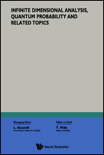
INFINITE DIMENSIONAL ANALYSIS QUANTUM PROBABILITY AND RELATED TOPICS
Illuminating the Intersections of Mathematics and PhysicsINFINITE DIMENSIONAL ANALYSIS QUANTUM PROBABILITY AND RELATED TOPICS, published by WORLD SCIENTIFIC PUBL CO PTE LTD, is a key academic journal dedicated to the exploration of advanced themes in applied mathematics, mathematical physics, and quantum probability. Since its inception in 1998, the journal has established itself as a critical resource for researchers and professionals in these interdisciplinary fields, currently standing in the third quartile according to the 2023 category rankings. Scholars can access a wealth of rigorous articles that delve into infinite dimensional analysis, providing valuable insights pertinent to statistical and nonlinear physics, and offering a platform for pioneering research. This journal not only bridges theoretical frameworks and practical applications but also nurtures a collaborative environment for emerging and established scholars. Through its commitment to advancing knowledge, INFINITE DIMENSIONAL ANALYSIS QUANTUM PROBABILITY AND RELATED TOPICS serves as an indispensable tool for anyone engaged in the forefront of quantum probability research.
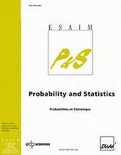
ESAIM-Probability and Statistics
Cultivating excellence in statistical methodologies.ESAIM-Probability and Statistics, published by EDP Sciences S A, is a prominent journal focused on advancing the field of probability and statistics. With an ISSN of 1292-8100 and E-ISSN 1262-3318, this journal has been a beacon of scholarly communication since its inception in 1997. Operating out of France, it offers a platform for researchers and professionals to share significant findings and foster collaboration within the statistical community. Designated as Q3 in the Statistics and Probability category for 2023, it plays a vital role in the dissemination of critical research, despite its recent Scopus ranking of 226 out of 278 indicative of its growing visibility and impact. Researchers, students, and professionals alike benefit from its rich pool of analytical insights and innovative methodologies, marking it as an essential resource for those immersed in statistical theory and applications. With a commitment to excellence in research, ESAIM-Probability and Statistics continues to contribute to the instructional and professional development of its readership.
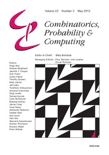
COMBINATORICS PROBABILITY & COMPUTING
Unraveling Complexities in Mathematics and ComputingCOMBINATORICS PROBABILITY & COMPUTING is a premier journal published by Cambridge University Press, focusing on the cutting-edge fields of combinatorics, probability, and their computational aspects. Established in 1992 and set to continue its impactful discourse through 2024, this journal holds a distinguished reputation, reflected in its Q1 ranking in applied mathematics, computational theory, and statistics, showcasing its pivotal role in advancing research in these areas. With an ISSN of 0963-5483 and an E-ISSN of 1469-2163, the journal welcomes high-quality papers that contribute to the theoretical foundations and practical applications of the disciplines. While it is not available as open access, its accessibility through institutional subscriptions ensures wide readership within academia. The journal is a vital resource for researchers, professionals, and students alike, providing a platform for innovative ideas and pioneering research that shapes the future of mathematics and computer science.

Forum of Mathematics Pi
Fostering Collaboration in Cutting-edge ResearchForum of Mathematics Pi, published by Cambridge University Press, stands at the forefront of mathematical research, providing an open-access platform since 2013. With an ISSN of 2050-5086, this journal has rapidly established itself within the mathematical community, particularly noted for its high impact in the realms of Algebra and Number Theory, Analysis, Discrete Mathematics and Combinatorics, Geometry and Topology, Mathematical Physics, and Statistics and Probability, as evidenced by its 2023 Q1 rankings across these categories. Its placement within the top quartile signifies its importance and influence, attracting submissions from leading researchers and academicians around the globe. The journal’s diverse scope and rigorous peer-review process ensure a high standard of scholarly excellence, making it an indispensable resource for professionals, students, and researchers eager to stay informed about cutting-edge mathematical advancements. Access to its comprehensive array of articles is openly available, promoting a culture of collaboration and knowledge sharing in the mathematics community.

Theory of Probability and Mathematical Statistics
Connecting Theory and Practice in Statistical ScienceTheory of Probability and Mathematical Statistics, published by the Tarás Shevchenko National University of Kyiv, Faculty of Mechanics and Mathematics, serves as a vital resource for academics and practitioners in the field of statistics and probability. With an ISSN of 0094-9000 and E-ISSN 1547-7363, this journal aims to advance theoretical insights and practical applications related to probability theory and statistical methods. Operating from the heart of Ukraine, this journal has been influential since its inception in 2004 and continues to contribute to the academic community as it converges through a significant period until 2024. Despite currently not offering Open Access options, it maintains a respectable Q3 classification in both Statistics and Probability, highlighting its stability within the scholarly landscape. The journal's Scopus rankings further emphasize its specialization, ranking #121 in Statistics, Probability, and Uncertainty, and #203 in Mathematics, underscoring its importance for researchers, students, and professionals seeking to enrich their understanding and foster innovation in these disciplines.